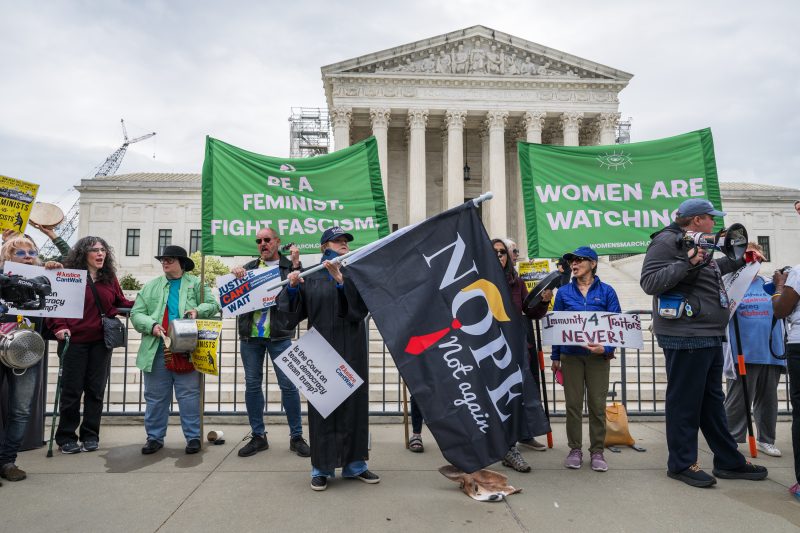For someone who has so strongly objected in recent weeks to the idea that he’s an authoritarian or a threat to democracy, Donald Trump has a funny way of showing it.
At a rally Monday in Pennsylvania, the former president said for at least the fourth time that criticizing judges and justices either is or should be illegal. And for what may be the first time, he directly said people who do so should go to jail.
This was not only a stunning comment about restricting free speech, but it suggests a standard that most likely would have landed Trump in jail long ago. Few modern political figures, after all, have spent so much time attacking judges and others involved in the judicial process, in an obvious attempt to apply political pressure.
It’s now Trump who says attempts to criticize and apply pressure — “playing the ref,” as he often puts it — should be a crime.
After praising the Supreme Court for favorable opinions at a rally Monday in Indiana, Pa., the former president turned to those who express the opposite view.
“And they take a lot of hits because of it,” Trump said of the justices. “It should be illegal what happens. You know you have these guys that are, like, playing the ref like the great Bobby Knight.
“These people should be put in jail the way they talk about our judges and our justices, trying to get them to sway their vote, sway their decision.”
Trump has been slowly building toward an explicit threat of jail time. He’s previously said criticizing judges is or should be illegal, often while invoking the Indiana University coaching legend Knight, who famously berated referees.
Here’s what Trump has said:
In Bozeman, Mont., in early August, Trump said what critics of judges were doing was “in my opinion, totally illegal.”
The next week, in Wilkes-Barre, Pa., Trump said, “I believe it’s illegal what they do. … I really think it’s illegal what they do with the judges and justices.” He later added that “playing the ref with our judges and our justices should be punishable by very serious fines and beyond that.”
This month, Trump at a news conference suggested prosecuting critics of U.S. District Judge Aileen M. Cannon, who delivered favorable rulings for him in his federal classified-documents case before ultimately dismissing it. (Previous judges had rejected the justification she accepted, and the Justice Department is appealing.) “I think it should be illegal; that’s what the DOJ should look into,” Trump said. “The legality of these people taking a brilliant judge and demeaning her, and taking other people that are fair and solid and demeaning them.”
Monday’s comments go further. Trump specifically invoked jail time — whereas in Wilkes-Barre, he had referred more obliquely to “very serious fines and beyond that.”
There have been threats made against Supreme Court justices in recent years, including most notably an alleged assassination attempt in 2022 against Justice Brett M. Kavanaugh. Last week, an Alaska man who allegedly threatened to torture and kill six Supreme Court justices was arrested.
But Trump notably didn’t single out obviously illegal activity like that; he instead pitched the idea that merely criticizing judges and justices in ways that are intended to influence them is or should be illegal. In the case of Cannon, he didn’t even cite attempts to influence her — just the fact that critics were “demeaning” her.
As for Trump’s more general focus on “playing the ref,” that’s not only a virtually impossible standard — how do you distinguish between mere criticism and attempts to influence? — but it’s also a standard that would be highly problematic for Trump personally.
From the moment he became president, Trump has unleashed a torrent of criticism aimed at judges and justices who not only rule against him, but also ones who would soon rule.
In his first few weeks in office, Trump decried a Republican-appointed judge for striking down his travel ban on people from predominantly Muslim countries. Trump said, “If something happens, blame him” — apparently a reference to any terrorist attack that might result. Just think of the message that sent to other judges who might strike down his policies: that they would be blamed for an ensuing tragedy.
Even Trump’s own Supreme Court nominee Neil M. Gorsuch later criticized him for these comments, calling the attacks on the judiciary “demoralizing.”
Around the same time, Trump warned that a three-judge appeals panel that was set to rule would marginalize themselves politically if they decided the wrong way — a not-terribly subtle suggestion that he would marshal political opposition to the courts.
Trump went on to do plenty of marshaling, as this laundry list of examples from the Brennan Center for Justice makes clear. His target was often the same Supreme Court he now says shouldn’t be criticized. More recently, as Trump has faced his own legal scrutiny, he has endlessly attacked judges who rule in ways he disagrees with and lodged personal attacks against them and even their families.
It’s been so extensive that it’s difficult to dismiss as Trump merely blowing off steam and expressing disagreement; he’s sent a consistent message that prosecuting one of the most politically powerful people in the country — him — and ruling against him will come with a price.
Presidents before Trump generally avoided criticizing the courts, but it isn’t illegal. Now he suggests that it should be — at least for anyone not named Trump.

